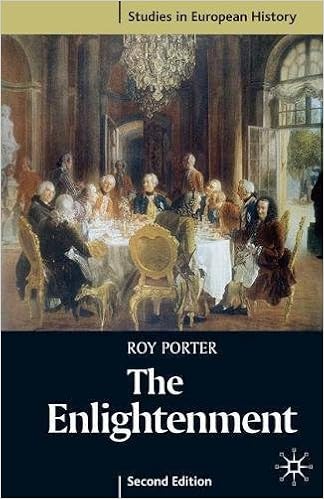The Enlightenment or ‘Age of Reason’ was a period in the late seventeenth century and early eighteenth century, where a group of philosophers, scientists and thinkers advocated new ideas based on reason. This period saw a decline in the power of absolute monarchies, a reduction in the pre-eminence of the Church and a rise of modern political ideologies, such as liberalism, republicanism and greater independence of thought. The Enlightenment ideas were influential forces behind the American and French revolutions.


 Rene Descartes (1596 – 1650) Rene Descartes was a French philosopher and mathematician. Descartes made a significant contribution to the philosophy of rationalism. Descartes’ Meditations was ground-breaking because he was willing to doubt previous certainties and tried to prove their validity through logic. Later empiricists disagreed with Descartes methods, but his philosophy opened up many topics to greater discussion. Although Descartes ‘proved’ the existence of God, his doubt was an important step in promoting reason over faith. Descartes also made significant discoveries in analytical geometry, calculus and mathematics.
Rene Descartes (1596 – 1650) Rene Descartes was a French philosopher and mathematician. Descartes made a significant contribution to the philosophy of rationalism. Descartes’ Meditations was ground-breaking because he was willing to doubt previous certainties and tried to prove their validity through logic. Later empiricists disagreed with Descartes methods, but his philosophy opened up many topics to greater discussion. Although Descartes ‘proved’ the existence of God, his doubt was an important step in promoting reason over faith. Descartes also made significant discoveries in analytical geometry, calculus and mathematics.
 Baruch Spinoza (1632-1677) Spinoza was a Jewish-Dutch philosopher. He was an influential rationalist, who saw the underlying unity of the universe. He was critical of religious scriptures and promoted a view that the Divine was in all, and the Universe was ordered, despite its apparent contradictions. His philosophy influenced later philosophers, writers and romantic poets, such as Shelley and Coleridge.
Baruch Spinoza (1632-1677) Spinoza was a Jewish-Dutch philosopher. He was an influential rationalist, who saw the underlying unity of the universe. He was critical of religious scriptures and promoted a view that the Divine was in all, and the Universe was ordered, despite its apparent contradictions. His philosophy influenced later philosophers, writers and romantic poets, such as Shelley and Coleridge.
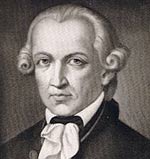 Immanuel Kant (1724 – 1804) Immanuel Kant was an influential German philosopher whose ‘Critique of Pure Reason’ sought to unite reason with experience and move philosophy on from the debate between rationalists and empiricists. Kant’s philosophy was influential on future German idealists and philosophers, such as Shelling and Schopenhauer.
Immanuel Kant (1724 – 1804) Immanuel Kant was an influential German philosopher whose ‘Critique of Pure Reason’ sought to unite reason with experience and move philosophy on from the debate between rationalists and empiricists. Kant’s philosophy was influential on future German idealists and philosophers, such as Shelling and Schopenhauer.
 John Locke (1632 – 1704) Locke was a leading philosopher and political theorist, who had a profound impact on liberal political thought. He is credited with ideas, such as the social contract – the idea that government needs to be with the consent of the governed. Locke also argued for liberty, religious tolerance and rights to life and property. Locke was an influential figure on those involved in the American and French revolutions, such as Jefferson, Madison and Voltaire.
John Locke (1632 – 1704) Locke was a leading philosopher and political theorist, who had a profound impact on liberal political thought. He is credited with ideas, such as the social contract – the idea that government needs to be with the consent of the governed. Locke also argued for liberty, religious tolerance and rights to life and property. Locke was an influential figure on those involved in the American and French revolutions, such as Jefferson, Madison and Voltaire.


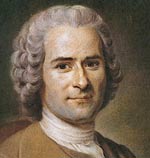 Jean-Jacques Rousseau (1712-1778) Rousseau was a political philosopher widely known for his ‘Social Contract‘ (1762), which sought to promote a more egalitarian form of government by consent and formed the basis of modern republicanism. His ideas were influential in the French and American revolutions.
Jean-Jacques Rousseau (1712-1778) Rousseau was a political philosopher widely known for his ‘Social Contract‘ (1762), which sought to promote a more egalitarian form of government by consent and formed the basis of modern republicanism. His ideas were influential in the French and American revolutions.
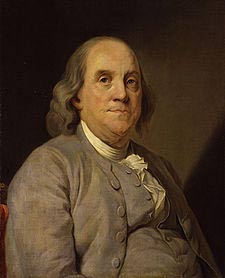 Benjamin Franklin (1706-1790) One of the American Founding Fathers of the United States. He was an author, politician, diplomat, scientist and statesman. He was a key figure in the American Enlightenment, which saw major breakthroughs in science and ideas of political republicanism. Franklin was an early supporter of colonial unity and the United States.
Benjamin Franklin (1706-1790) One of the American Founding Fathers of the United States. He was an author, politician, diplomat, scientist and statesman. He was a key figure in the American Enlightenment, which saw major breakthroughs in science and ideas of political republicanism. Franklin was an early supporter of colonial unity and the United States.
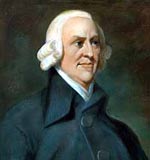 Adam Smith (1723-1790) was a Scottish social philosopher and pioneer of classical economics. He is best known for his work ‘The Wealth of Nations‘ which laid down a framework for the basis of classical free-market economics. Smith is often referred to as the ‘Father of Economics.’ Smith’s work makes a strong case for free market economics, but he was also aware of situations where the free market could be against the public interest, for example monopolies.
Adam Smith (1723-1790) was a Scottish social philosopher and pioneer of classical economics. He is best known for his work ‘The Wealth of Nations‘ which laid down a framework for the basis of classical free-market economics. Smith is often referred to as the ‘Father of Economics.’ Smith’s work makes a strong case for free market economics, but he was also aware of situations where the free market could be against the public interest, for example monopolies.
 Thomas Jefferson (1743-1826) was an American Founding Father and the principal author of The Declaration of Independence (1776) In this declaration, Jefferson laid out the fundamental principles of America, calling for equality and liberty. He also advocated ending slavery and promoting religious tolerance.
Thomas Jefferson (1743-1826) was an American Founding Father and the principal author of The Declaration of Independence (1776) In this declaration, Jefferson laid out the fundamental principles of America, calling for equality and liberty. He also advocated ending slavery and promoting religious tolerance.
Citation: Pettinger, Tejvan. “Famous people of The Enlightenment”, Oxford, biographyonline.net, 4th June 2013. Last updated 21st February 2018.
The Enlightenment
The Enlightenment at Amazon
Related pages



 Famous Scientists – Scientists from Aristotle and Archimedes to Albert Einstein and Charles Darwin. Including scientists of the Enlightenment Period.
Famous Scientists – Scientists from Aristotle and Archimedes to Albert Einstein and Charles Darwin. Including scientists of the Enlightenment Period.


